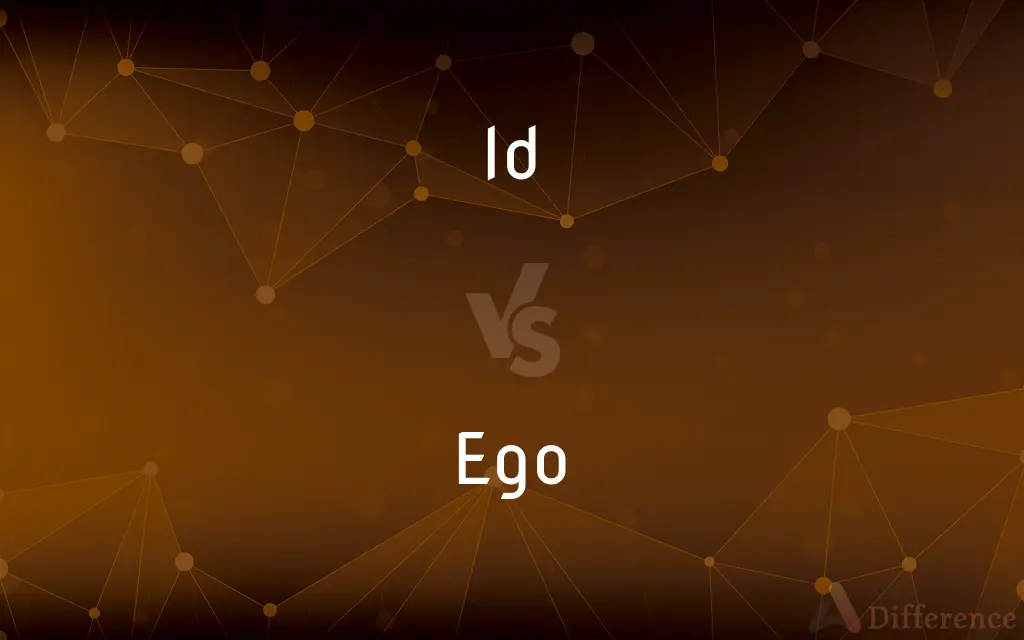Id vs. Ego — What's the Difference?
By Tayyaba Rehman & Maham Liaqat — Updated on April 25, 2024
The id represents instinctual drives and desires, functioning unconsciously, while the ego mediates between the id, reality, and societal norms.

Difference Between Id and Ego
Table of Contents
ADVERTISEMENT
Key Differences
The id is a key component of Sigmund Freud's psychoanalytic theory, representing the part of the personality that contains our primal, instinctual drives and unconscious desires. On the other hand, the ego acts as the rational part that mediates between the unrealistic id and the external real world.
The id operates based on the pleasure principle, always seeking immediate gratification of its desires, whereas the ego follows the reality principle, which strives to satisfy the id’s desires in realistic and socially appropriate ways.
While the id is entirely unconscious, the ego has both conscious and unconscious elements.
The ego also employs defense mechanisms to cope with stress and reduce anxiety caused by conflicts between the id’s demands and societal expectations. In contrast, the id remains unresponsive to reality, persisting in its primitive state.
Comparison Chart
Theory Component
Part of Sigmund Freud's psychoanalytic theory
Also part of Freud's theory
ADVERTISEMENT
Function
Houses primal drives and desires
Mediates between id, reality, and superego
Operating Principle
Pleasure principle (immediate gratification)
Reality principle (realistic satisfaction)
Consciousness
Unconscious
Partly conscious, partly unconscious
Response to Stress
Unresponsive to reality
Uses defense mechanisms to manage stress
Compare with Definitions
Id
Operates on pleasure.
The id drives one to indulge in pleasures without considering consequences.
Ego
Defense mechanisms.
The ego uses rationalization to justify actions and reduce guilt.
Id
Instinctual energy.
The id provides the basic energy and drives of human behavior.
Ego
Conscious reasoning.
The ego helps weigh the pros and cons before making a decision.
Id
Impulsive behavior.
Impulsive decisions often stem from the id’s unchecked desires.
Ego
Rational mediator.
The ego decides how and when to fulfill desires realistically.
Id
Primal drives.
The id seeks instant satisfaction, like a baby crying for food.
Ego
Balancing force.
The ego balances internal desires with external reality.
Id
Unconscious desires.
The id influences our deepest desires without our awareness.
Ego
Reality-based actions.
The ego delays gratification to meet societal expectations.
Id
A form of identification, especially an ID card.
Ego
A person's sense of self-esteem or self-importance
He needed a boost to his ego
Id
Variant of Eid.
Ego
The self, especially as distinct from the world and other selves.
Id
In psychoanalytic theory, the division of the psyche that is totally unconscious and serves as the source of instinctual impulses and demands for immediate satisfaction of primitive needs.
Ego
In psychoanalytic theory, the division of the psyche that is conscious, is responsible for our feelings of selfhood, and most directly interacts with external reality.
Id
To check the identification of, especially in order to verify legal age; card
The bouncer ID'ed everyone who looked younger than 30.
Ego
An exaggerated sense of self-importance; conceit.
Id
The unconscious impulsive component of the personality in the Freudian psychoanalytic model.
Ego
Appropriate pride in oneself; self-esteem.
Id
Alternative spelling of ide{{gloss}}
Ego
The self, especially with a sense of self-importance.
Id
(computing) Identifier.
Ego
The most central part of the mind, which mediates with one's surroundings.
Id
Used in citations to state that the citation is to the work immediately previously cited.
Ego
The conscious and permanent subject of all psychical experiences, whether held to be directly known or the product of reflective thought; the subject consciously considered as "I" by a person; - opposed to non-ego.
Id
Any document testifying to teh identity of the bearer, especially a card or badge.
Ego
That one of the three parts of a person's psychic apparatus that mediates consciously between the drives of the id and the realities of the external physical and social environment, by integrating perceptions of the external world and organizing the reactions to it. Contrasted with the id and superego.
Id
A small fresh-water cyprinoid fish (Leuciscus idus or Idus idus) of Europe. A domesticated variety, colored like the goldfish, is called orfe in Germany.
Ego
Egotism; as, a job requiring a diplomat without too much ego.
Id
That part of a person's psyche which is the unconscious source of impulses seeking gratification or pleasure; the impulses are usually modified by the ego and superego before being acted upon.
Ego
Self-esteem; as, he has an overinflated ego.
Id
A state in the Rocky Mountains
Ego
An inflated feeling of pride in your superiority to others
Id
A card or badge used to identify the bearer;
You had to show your ID in order to get in
Ego
Your consciousness of your own identity
Id
(psychoanalysis) primitive instincts and energies underlying all psychic activity
Ego
(psychoanalysis) the conscious mind
Common Curiosities
What are some examples of ego defense mechanisms?
Examples include rationalization, denial, repression, and projection.
How does the ego differ from the id in terms of consciousness?
The ego is partly conscious and operates with awareness of reality, unlike the entirely unconscious id.
How does understanding the id and ego help in psychotherapy?
It helps in identifying the sources of emotional conflict and developing strategies to manage them effectively.
Why is the ego considered the mediator in Freud’s psychoanalytic theory?
The ego is considered the mediator because it balances the demands of the id, the superego, and reality.
How do the id and ego interact within a person?
The id generates basic impulses and desires, while the ego manages these impulses through reality-based mechanisms.
Can the id be changed or influenced?
The id is a fixed, unconscious part of the personality and is not easily influenced by conscious thought.
What is the relationship between the id, ego, and superego?
The id provides basic drives, the ego mediates between the id and reality, and the superego adds moral considerations.
How does the ego develop over time?
The ego develops from childhood as one learns to cope with reality and societal norms.
What is the main function of the id?
The main function of the id is to seek immediate satisfaction of primal and instinctual desires.
What happens when the ego fails to mediate effectively?
When the ego fails, it can result in anxiety, neurosis, or maladaptive behaviors.
Does the id have a role in creative activities?
Yes, the id can influence creativity by allowing the unconscious mind to express itself.
Is the ego always successful in controlling the id?
Not always; the ego struggles mightily at times, especially under stress, to control the id’s impulses.
Share Your Discovery

Previous Comparison
Barbecue vs. Tandoor
Next Comparison
Purple vs. VioletAuthor Spotlight
Written by
Tayyaba RehmanTayyaba Rehman is a distinguished writer, currently serving as a primary contributor to askdifference.com. As a researcher in semantics and etymology, Tayyaba's passion for the complexity of languages and their distinctions has found a perfect home on the platform. Tayyaba delves into the intricacies of language, distinguishing between commonly confused words and phrases, thereby providing clarity for readers worldwide.
Co-written by
Maham Liaqat














































